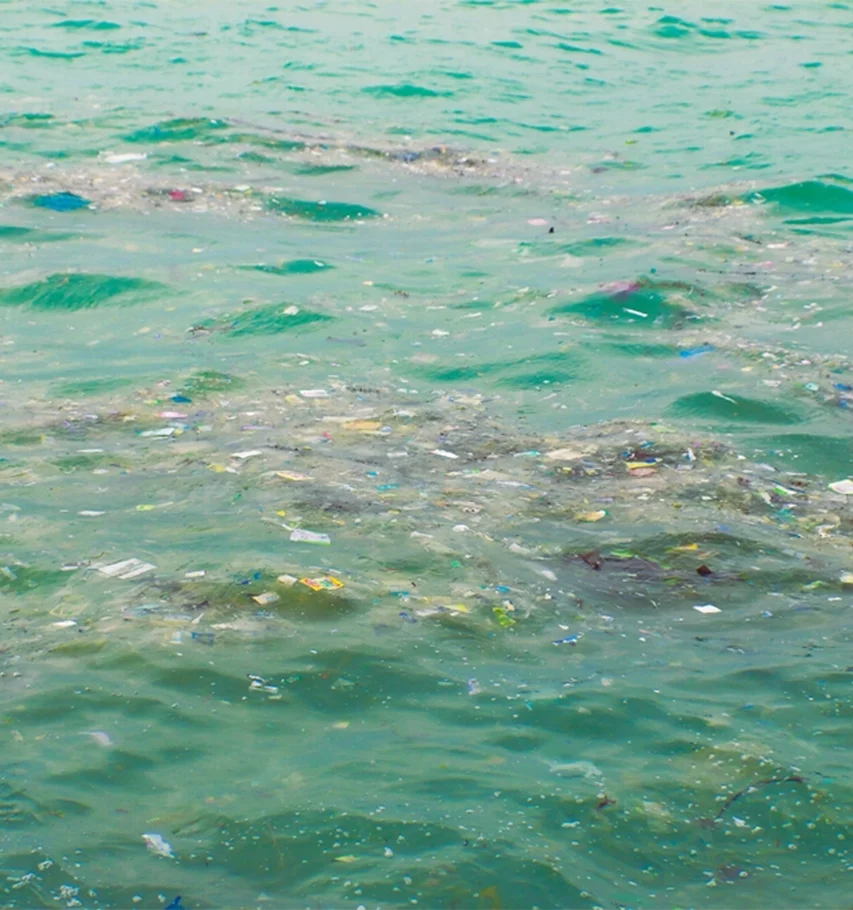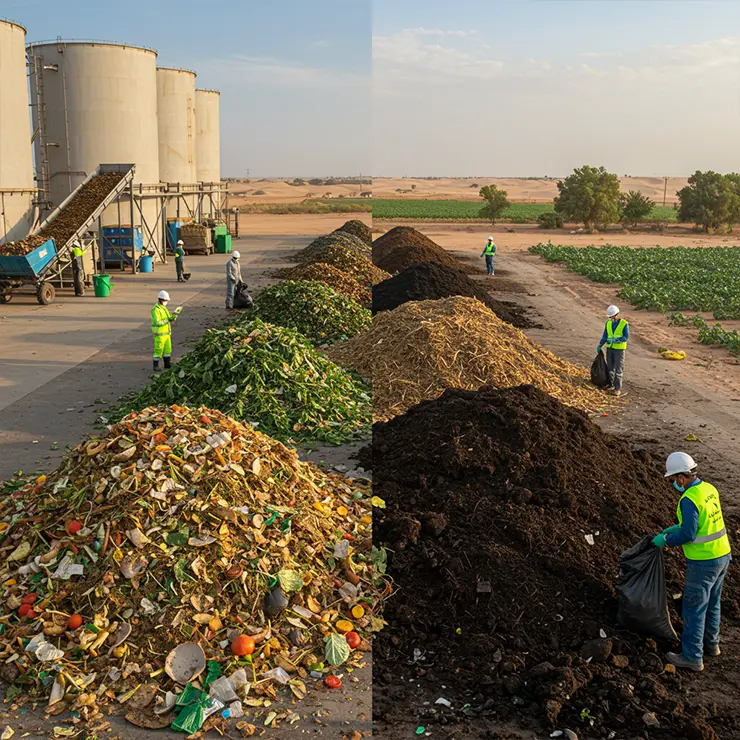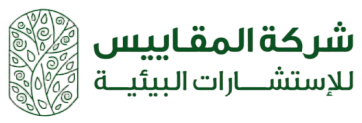Almaghais: Your partner in waste management and environmental compliance
At almaghais, we offer integrated solutions for managing various types of waste, including medical, industrial, municipal, construction and demolition waste, organic waste, and solid waste, in full compliance with the Kingdom's environmental regulations. Our services include assessment, classification, collection, and disposal of solid waste through safe and efficient methods, including treatment, source sorting, and the recovery of recyclable waste. We are committed to reducing environmental impact and promoting sustainable practices through modern recycling technologies and solutions designed to treat waste in ways that ensure environmental and public health protection. We also allow our customers to request a waste container that suits the needs of their various projects, whether residential, industrial, or commercial. We are a municipality-certified waste company and operate according to strict standards that ensure compliance with local regulations, including those related to the Riyadh Landfill, and the systematic and sustainable burial of waste, effectively contributing to solving the waste problem in the Kingdom.




Almaghais waste management services:
• Waste collection at the source (project sites, facilities, or factories).
• Sorting and classifying waste into organic, solid, hazardous, medical, and recyclable waste.
• Establishing dedicated source separation systems to reduce mixed quantities.
• Handling solid waste generated by municipal, commercial, or residential activities through solid waste disposal services.
• Transporting and processing inorganic waste such as plastic, paper, metals, and glass.
• Implementing solid waste recycling solutions, reducing final waste, and promoting waste recycling.
• Collect organic waste from sources such as restaurants, markets, and farms.
• Treat organic waste using environmentally safe methods (such as aerobic or anaerobic composting).
• Reduce odor and gas emissions resulting from the decomposition of organic materials.
• Collect and transport medical waste from healthcare facilities in a closed and safe manner.
• Apply approved standards for separating infectious, sharp, and pharmaceutical waste.
• Treat medical waste using approved technologies such as autoclaving or incineration.
• Final disposal of medical waste remains in a manner that prevents environmental pollution and complies with the regulations of a municipality-approved waste company.
• Classify hazardous waste according to its nature (chemical, flammable, toxic, etc.).
• Transport hazardous waste using designated containers approved by official authorities.
• Prepare emergency plans and safely handle leaks or spills.
• Treat hazardous waste using specialized methods or transport it to licensed landfills, such as landfills.
• Prepare periodic reports and fully comply with the Saudi Hazardous Waste Regulations.
• Collecting rubble and waste from construction and demolition projects.
• Sorting demolition components (concrete, metals, wood, etc.) for recycling or proper disposal.
• Cleaning sites of demolition debris in accordance with safety and environmental hygiene requirements.
• Preparing waste management plans tailored to government and private projects.
• Environmental impact assessment studies related to waste production or treatment, and providing solutions to waste problems.
• Providing innovative solutions to reduce costs and improve environmental performance of institutions, with the possibility of requesting a waste container depending on the type of project.
Types of waste covered by almaghais services
Almaghais offers comprehensive waste management services of all types, in accordance with the Kingdom's approved environmental regulations. These services include:
Such as household, garden, and market waste.
Resulting from production activities and factories.
From hospitals and health centers (such as infectious, sharp, and pharmaceutical medical waste), it is handled according to the standards of a municipality-approved waste company.
Such as chemicals, flammable, toxic, and radioactive materials, with the possibility of transporting them to a landfill or approved waste disposal sites.
From restaurants, farms and slaughterhouses, including food scraps and biodegradable materials.
Such as plastic, paper, metals, and glass, and work is being done to recycle these wastes as much as possible, as part of the solid waste disposal plan.
Debris includes concrete, wood, and metal resulting from construction or removal work, and can be dealt with by requesting a Riyadh waste container as needed.




The importance of waste management for projects and facilities:
Environmental studies are among the essential scientific and technical tools offered by Bee’ah, a company specializing in environmental consulting, to analyze the potential environmental impacts of development and industrial activities and propose appropriate solutions to environmental pollution. These studies fall within a comprehensive framework of environmental services, including:
- Comply with local and international environmental regulations and avoid fines or violations by cooperating with a municipality-approved waste company.
- Protecting the environment from pollution caused by untreated or random waste, especially in landfills or landfill sites.
- Promote public safety and reduce health risks to workers and the surrounding community, especially when handling medical or hazardous waste.
- Improving the organization's corporate image as an environmentally responsible and sustainable entity.
- Utilizing resources by recycling waste and reducing operational costs.
- Supporting sustainable development goals and reducing the carbon footprint of projects.
Organic waste treatment methods
At almaghais, we employ advanced environmental methods to treat organic waste (such as food scraps, agricultural waste, and animal waste), with the goal of reducing environmental impact and transforming this waste into useful resources, within an integrated waste management system. Our approved methods include:
We use aerobic and anaerobic composting techniques to convert organic waste into nutrient-rich natural fertilizer for use in agriculture and soil improvement, reducing the need for landfilling.
It is a biological technology that produces bioenergy (methane gas) from the decomposition of organic waste in an oxygen-free environment, leaving an organic product that can be used as fertilizer, thus effectively supporting solutions to the organic waste problem.
For some types of organic waste with high moisture content, they are dried and then used as a thermal energy source or alternative fuel in some industries, to reduce reliance on traditional landfills.
We implement on-site organic waste sorting systems to facilitate processing and reduce contamination from mixing with other waste types, supporting waste recycling practices and reducing waste.




Safe disposal of contaminated materials within waste management
Almaghais places the utmost importance on disposing of contaminated waste as a fundamental part of its integrated waste management services. This includes waste containing harmful chemicals, organic pollutants, medical waste, or hazardous waste that requires special handling to ensure environmental and public health protection.
We rely on well-thought-out methodologies, including:
- Accurately determine the type of contamination through inspection and analysis.
- Classification of contaminated materials according to their hazards (flammable, toxic, radioactive, biological).
- Use approved, closed transport containers to ensure that materials do not leak during transport or temporary storage, in accordance with the requirements of a municipally approved waste company.
- Pre-treatment when required (e.g. chemical neutralization or special packaging).
- Final disposal in licensed facilities in accordance with environmental standards (such as high-temperature incineration, burial in the Riyadh landfill, or sites designated for hazardous waste).
These measures help prevent pollution from spreading to the air, soil, or water, and help entities and institutions fully comply with environmental regulations and legislation in the Kingdom.
Contact Us
For more information, please contact us
